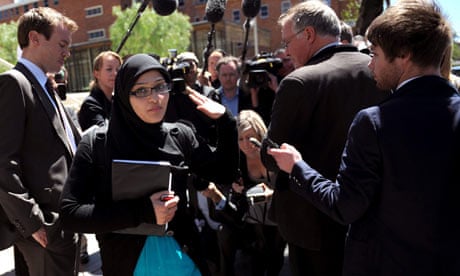Five Sydney men have been found guilty of conspiring to commit a terror attack, by stockpiling weapons and chemicals to make bombs, in one of the longest criminal trials in Australian history.
During the 10-month trial the crown heard from 300 witnesses and presented 3,000 exhibits, and the jury spent more than 30 days watching and listening to surveillance tapes and reviewing 18 hours of telephone intercepts.
The jury took 23 days to convict the men unanimously on a range of charges including possessing bomb-making instructions and explosive chemicals.
The men, who cannot be named for legal reasons, were arrested in a series of raids in 2005, after they had been under police surveillance for 16 months.
The crown argued the men had been pursuing violent jihad, stockpiling chemicals and detailed instructions for making bombs capable of causing large-scale death and destruction. But the prosecution case relied entirely on circumstantial evidence, and the target of the purported attack was never specified.
In his closing address the crown prosecutor, Richard Maidment, said he could not prove what the men were planning to do.
"The crown does not suggest that the evidence reveals that they had reached any firm conclusion as to what precise action was to be carried out, what targets were to be selected, who was actually to carry the bomb, where it was to be placed, how it was to be placed, how big it was going to be, whether it was going to be in a vehicle or in a backpack or how it was going to be taken to the relevant target," he said.
It took eight months of pre-trial court hearings and 65 judgments before the case began, as authorities argued for large amounts of evidence to be made secret from the public and the accused to protect national security.
"There have been very few media reports about this trial," said Nicola McGarrity, director of the terrorism and law project at the University of New South Wales.
"There were very broad ranging suppression orders placed over the trial. There were suppression orders on suppression orders."
Police said they found a cache of weapons in the south-west Sydney home of the accused ringleader, along with 28,000 rounds of ammunition – enough to keep firing for 37 hours, the court was told.
The jury heard that one of the accused had attended a paramilitary training camp in Pakistan run by the terrorist organisation, Lashkar-e-Taiba, but a key FBI witness agreed with the defence that it could have been a case of mistaken identity.
They were also told three of the men joined a paramilitary-style camp in western New South Wales, although the defence claimed the men were just hunting and camping.
Police monitored the men as they used false names to acquire mobile phones and spoke in code, aware they were under surveillance. They also acquired night-vision cameras.
Each of the men possessed extremist material on their home computers on topics including the September 11 attacks on the US in 2001 and ritual beheadings.
Originally nine men were arrested, but four confessed. The remaining five, who cannot be named because of another ongoing trial, face maximum life sentences.
